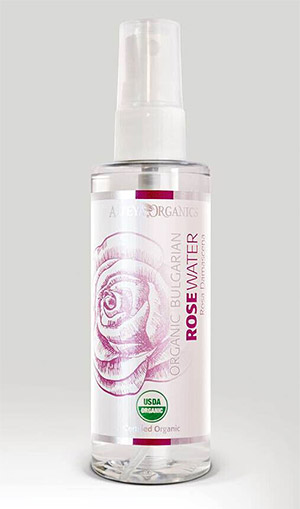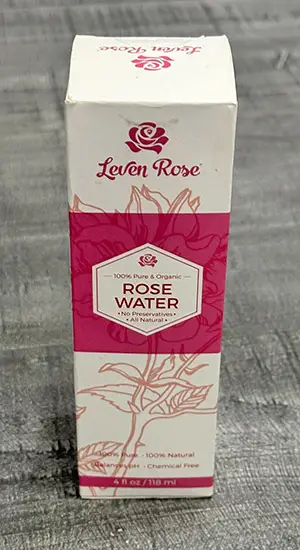
If you have rosacea and are thinking about using rose water, you might be wondering if it’s a good idea. The simple answer is that rose water can be beneficial for many people with rosacea. Its anti-inflammatory properties often help reduce redness and soothe irritated skin.
Rose water, made from rose petals through steam distillation, is more than just a pleasant scent—it’s packed with antioxidants and has been used in skincare for centuries. But how effective is it for rosacea?
In this article, we’ll explore why rose water might help your skin and provide tips on using it safely. Let’s get started.
Table of Contents
- How Rose Water Can Help Rosacea
- Potential Downsides of Rose Water
- How to Use Rose Water for Rosacea
- Choosing the Right Rose Water for Rosacea
- Top Picks for Rose Water
- Final Thoughts
How Rose Water Can Help Rosacea
Rose water is a popular choice in skincare, especially for sensitive conditions like rosacea. Here’s why:
Anti-inflammatory Properties
Rose water contains natural anti-inflammatory compounds that help reduce the redness and inflammation associated with rosacea. By soothing irritated skin, it can provide relief from flare-ups and minimize discomfort.
Soothing and Calming Effects
The cooling sensation of rose water offers immediate relief for rosacea-prone skin. Its calming effects help alleviate itchiness and discomfort, making it a gentle and effective option for irritated skin.
Antibacterial Benefits
Rose water has antibacterial properties that may help manage bacteria commonly found on the skin of rosacea sufferers. Bacteria such as Staphylococcus epidermidis and Bacillus oleronius are often associated with rosacea. By keeping bacterial growth in check, rose water can prevent further irritation and promote healthier skin.
Rose Water in Anti-Redness Products
Thanks to its beneficial properties for rosacea, rose water is a key ingredient in many anti-redness skincare products. For example, Argan Organics Anti-Redness Rosacea Cream lists rose water as the first ingredient, highlighting its prominence and effectiveness.
Additional Benefits of Rose Water for Skin
Beyond its benefits for rosacea, rose water is also known for its general skincare advantages. It helps to hydrate and revitalize the skin, maintaining its natural pH balance.
Rose water’s antioxidant properties aid in strengthening skin cells and regenerating skin tissues, giving you a fresh, youthful glow. It’s also effective in controlling excess oil and can help prevent acne by maintaining the skin’s natural moisture barrier.

Potential Downsides of Rose Water
While rose water offers many benefits, it’s important to be aware of potential downsides:
Allergic Reactions
Some people may experience allergic reactions to rose water, including redness, itching, or a rash. It’s always a good idea to do a patch test on a small area of skin before using rose water more widely.
Sensitivity
Even though rose water is generally gentle, individuals with extremely sensitive skin might still find it irritating. If you notice any discomfort or worsening of symptoms, discontinue use immediately.
Quality and Purity
Not all rose water products are created equal. Some may contain added alcohol, fragrances, or other ingredients that can irritate the skin. Always check the label and opt for 100% pure rose water without any additives.
How to Use Rose Water for Rosacea
Using rose water effectively can help maximize its benefits for rosacea-prone skin. Here’s how you can incorporate it into your skincare routine:
Patch Test First
Before applying rose water to your face, always do a patch test on a small area of skin, such as your wrist or behind your ear. This will help you determine if you have any adverse reactions to the product.
Choose Pure Rose Water
Ensure that you are using 100% pure rose water without any added alcohol, fragrances, or other potentially irritating ingredients. Products labeled as “organic” or “natural” are often safer choices.
Incorporate into Your Routine
- As a Toner: After cleansing your face, apply rose water using a cotton pad or spritz it directly onto your skin. This can help to soothe and hydrate your skin while preparing it for the next steps in your routine.
- With Your Moisturizer: Mix a few drops of rose water with your regular moisturizer to enhance its hydrating and soothing properties.
- Face Mask: Combine rose water with other soothing ingredients like aloe vera or oatmeal to create a calming face mask.
Consistency is Key
For best results, use rose water consistently. Incorporating it into your daily skincare routine can help maintain its soothing benefits over time.
Monitor Your Skin’s Reaction
Keep an eye on how your skin responds to rose water. If you notice any irritation or worsening of rosacea symptoms, discontinue use and consult with a dermatologist.
Choosing the Right Rose Water for Rosacea
Selecting the right rose water for rosacea involves considering a few key factors to ensure it’s suitable for your sensitive skin:
- Purity: Opt for high-quality, pure rose water without any additives or artificial fragrances.
- Source: Choose products made from Rosa damascena (Damask rose) for its therapeutic benefits.
- Extraction Method: Prefer steam-distilled rose water as it tends to be purer and more potent.
- Packaging: Look for products in dark glass bottles to protect from light and air.
- Recommendations: Check online reviews and seek advice from friends or dermatologists.
Top Picks for Rose Water
Here are some highly recommended rose water products that are well-suited for rosacea-prone skin:
Alteya Organics – 100% Pure Organic Bulgarian Rose Water: This steam-distilled rose water from Rosa damascena petals is known for its purity and lack of additives or artificial fragrances.

100% Pure – Rose Water Face Mist: Combines rose hydrosol with aloe vera, calendula, and chamomile extracts for soothing and hydrating effects, along with sodium hyaluronate for extra moisture.
Akamuti Organic Rosewater: Made from high-quality damask roses, this steam-distilled product offers refreshing and toning properties without additives or pesticides.
Leven Rose Moroccan Rose Water Toner: This rose water toner, packaged in a dark amber glass bottle, is made from Moroccan rose flowers. It is free of alcohol, glycerin, fragrances, and parabens, making it ideal for soothing and moisturizing sensitive skin without added irritants.

Final Thoughts
Rose water can be a gentle and effective addition to your skincare routine if you have rosacea. Its anti-inflammatory, soothing, and antibacterial properties make it a popular choice for calming irritated skin and reducing redness.
However, it’s important to remember that everyone’s skin is different. What works well for one person might not work for another. Always start with a patch test and choose high-quality, pure rose water to avoid potential irritants.
If you decide to try rose water, be patient and give it time to see how your skin responds. And, as always, if you have any concerns or persistent issues, consulting with a dermatologist is a good idea.
Incorporating rose water into your daily routine could be the soothing relief your skin needs, but it’s always best to approach with care and attention to how your skin reacts.

Petra Nakashian (previously Kravos) is a dedicated natural health and beauty blogger, driven by the loss of her parents to cancer, which led her to meticulously research beauty product ingredients. With over 10 years of experience, her in-depth knowledge has made her a trusted expert in the field. Founder of Be Healthy Now and Green Beauty Talk, Petra recently expanded her expertise with Beauty Insights Hub, exploring a wider range of beauty treatments. Committed to transparency and honesty, her work is a vital resource for navigating the complex world of beauty.

